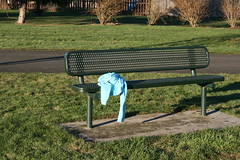
I did not recognize him the next time we met. By then, my partners had returned and we were settling back into our Saturday morning baking meetings. When we had first remodeled the bungalow, the contractor suggested we turn the dining area and kitchen into useable office space. We unanimously rejected his plans, choosing instead to preserve the atmosphere that had attracted us to the property. We planned to use the kitchen as a break area and the dining room for meetings and group therapy.
One Saturday, Gladys asked us to help prepare cookies for her daughter’s softball team bake sale. As we discussed cases, we discovered magic in that run-down kitchen. Solutions emerged as yolks slid from broken shells. Each spatula stroke brought further understanding. We connected. We started baking each Saturday, eventually using profits from the practice to renovate the kitchen, adding commercial ovens and dishwashers. We experimented with baking in our group therapy sessions. These kitchen chats became so popular, they filled months in advance and many patients remained on the wait list.
For our first meeting of the New Year, I was the only one with cases to share. My head buried in the screen, I skimmed my notes as the other three kneaded and stirred. Absorbed in the process, I almost didn’t hear Lenore when she spoke. She repeated her question, “Maia, did you say she was Italian?” I adjusted my glasses and read the transcript again, “Yeah. His wife was from Italy. I think he said she moved back after the divorce.”
She wrinkled her nose and scratched it with her floury fingers, leaving a smear of white residue. “Gary something, right? He was here last year. They were ready to adopt and something happened to the baby.” I scrolled back through my notes to make sure, but I was certain his name was not Gary. “Mmmm, no. Different guy. Mine’s a ‘Callum.’ Not even close. Common story, though. Adoptions fall through all the time.” I brushed at my nose until she got the hint and swiped at her flour trail.
After our meeting, the others left while I curled up on a couch near the stone fireplace to read a novel while I waited for the bread to finish. I felt privileged to be able to spend my Saturdays this way. My career was my passion. I was fortunate to be able to practice with friends who understood and accepted me. The smell of bread in the oven always filled me with gratitude. When the loaves had completed their cycle through loving hands, I wrapped them for delivery to the mission.
Anders was there to meet me and we walked down to the coffee shop on the beach. We talked confidentially of common cases, and I received the latest news of his children in college. This had been our weekly routine for many years, and something I treasured. Thirty minutes with Anders carried me through each week. His work was infinitely unfathomable. I had almost decided one had to be from a different species entirely to work as a therapist for a religious charity organization.
We stood to leave and that is when I noticed Callum, except, at the time, I didn’t remember who he was. He looked familiar, but also so comfortable in the chair near the fireplace, concentrating on the screen in front of him. He was part of the scenery, a landscape of sorts. I may have seen him a hundred times and never noticed. This is what happens with routine. This is why I keep few routines, but they are meaningful to me.
I did not remember who he was until I arrived back home and began to settle in for the night. I felt uneasy at making another mistake with his case. I had taken the familiar coffee shop scene for granted. We do that with family, friends and colleagues. When we get used to an arrangement, we turn it into a snapshot, and then neglect to notice subtle changes. We miss the slight movement of light with potential to inspire. We avoid the shadows of self-destructive behavior, in favor of maintaining status quo. I accepted, though, that there was nothing I could have done differently, even if I had recognized him. I knew he had signed an agreement not to meet socially or to extend invitations for engagement outside the professional practice. I had the same responsibility. We were inches from each other for a moment, yet there was nothing I could have done to discover more of his story.









